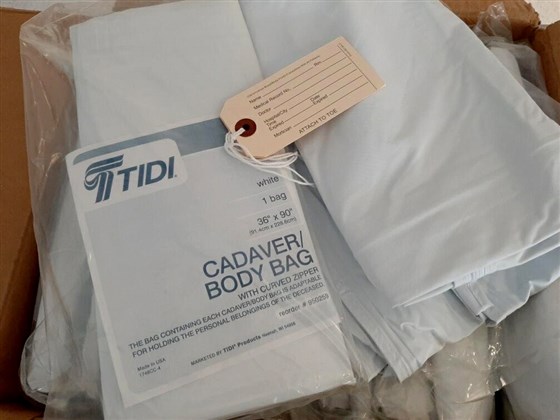
Body bags instead of medical supplies for Native Americans fighting COVID-19 in Washington state
The delivery was said to be a mistake by a distributor through the King County Public Health Department
Back in mid-March, Seattle, Washington was the first epicenter of COVID-19 in the U.S.
At the time, the health center associated with the Seattle Indian Health Board made an urgent request to county, state and federal authorities for medical supplies to help in the fight against coronavirus.
Three weeks later, the health center got its package from the King County Public Health Department, but it didn’t contain the supplies they wanted.
Instead of personal protective equipment for health workers and COVID-19 tests for patients, the health center got body bags and toe-tags for their deceased.
Esther Lucero, CEO of the Seattle Indian Health Board, told NBC News that members of her staff turned “ghost white” when opening the package.
She went on to clarify that it was a mistake delivery from a distributor through King County’s Public Health Department.
Despite the mistake, her chief research officer, Abigail Echo-Hawk, still decried the message it sent to Native Americans in the Seattle area and around the country about their precarious situation during the COVID-19 pandemic.
“This is a metaphor for what’s happening,” she told NBC News.
Outside of New York and New Jersey, the next highest infection rate in the U.S is in the Navajo Nation shared between Arizona, New Mexico and Utah in the Southwest.
That’s according to a report from NPR on April 24, that dove into the challenge of contact tracing on the reservation.
After being praised for their capabilities by Dr. Deborah Birx, Shanwell Damon, the epidemiology chief for the Navajo Nation painted a different picture.
RELATED CONTENT
The tribe has 80 contact tracers, but it’s not enough to cover the vast geography of the reservation, let alone some of the realities of living there. Damon told NPR of residents not having phones or needing to drive hours to get to and from health centers in addition to the lack of clean running water and unreliable electricity service.
Without basic necessities, the reservation has become a breeding ground for the virus.
“We’re doing our best,” said Damon, given the circumstances.
As part of the federal government’s CARES Act, $8 billion was slated to go to tribal governments to fight the virus, but the Navajo Nation argued against sharing the funds with Alaska Native Corporations — for-profit businesses that serve tribal villages.
They, along with 10 other tribes sued the federal government over the issue, which has slowed the distribution of stimulus funds.
The lawsuit has reverberated around the country and back to Seattle, where Lucero must now wait for their piece of an additional $4.8 billion announced by the Treasury Department for tribal governments.
Seattle is no longer the hotspot for COVID-19 it once was, but leaders like Lucero and Echo-Hawk fear the effects of a potential second wave on Native American communities.
“Are we going to keep getting body bags or are we going to get what we really need?” said Echo-Hawk.











LEAVE A COMMENT: